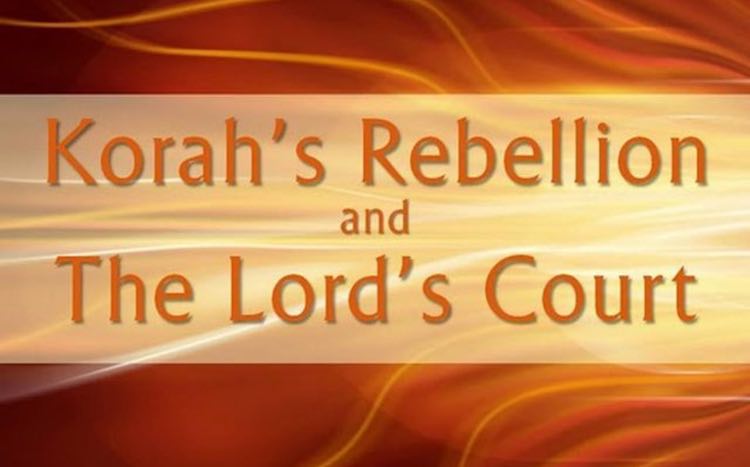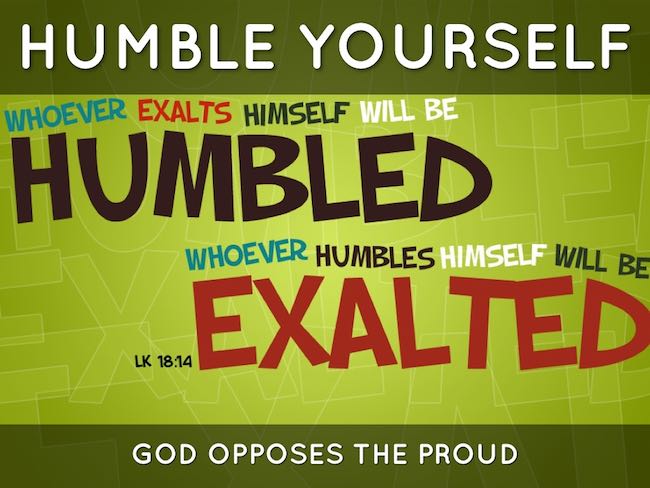Yeshua taught His disciples a leadership principle that was the polar opposite from what was being modeled for them by the Jewish religious leaders of their time:
Do not be called leaders; for One is your Leader, that is, Messiah. But the greatest among you shall be your servant. Whoever exalts himself shall be humbled; and whoever humbles himself shall be exalted. – Matt. 23:10-12
The world system teaches that one should strive for titles and power, however, God’s system teaches that one should humble himself and seek to be the servant of all. Yeshua not only taught this principle but He lived it.
As human beings with a fallen nature, we naturally desire to make a name for ourselves in this world and attempt to exalt ourselves by various means. In order to put Yeshua’s teaching into practice and humble oneself, one must do everything as unto God and trust Him for the results. If and when God chooses to exalt a person, it must be His doing alone and not the self-exaltation of the individual. We see a good example of this in this week’s Torah Portion.

Korach
This week’s Torah Portion is called “קרח” – “Korach” and is named after one of the main characters in the first part of this week’s reading. Korach’s name is generally translated into English as “Korah,” however, I’ll be referring to him as “Korach” throughout this commentary as this is the literal pronunciation of his name.
Most of us are familiar with the story of Korach and the rebellion which he led along with three other main leaders and 250 chosen men of the assembly of Israel. For those who are not so familiar with the story of Korach, I recommend reading the text itself, Numbers 16:1-40, along with previous commentaries that I have written on this subject: God’s Authority and Takers and Givers
Korach’s Rebellion
From the very beginning, Korach and his followers did not adhere to God’s principle of humbling oneself in order to be exalted, but rather, they chose to exalt themselves: “and they rose up before Moses,” (Num. 16:2). Korach and his men rose up in a self-exalting manner and then they proceeded to speak the following words:
They assembled together against Moses and Aaron, and said to them, “You have gone far enough, for all the congregation are holy, every one of them, and the LORD is in their midst; so why do you exalt yourselves above the assembly of the LORD?” – Num. 16:3
Korach’s band of rebels exalted themselves before Moses and Aaron, challenged the authority that Moses and Aaron had over the assembly, and accused Moses and Aaron of exalting themselves.
The Humility of Moses
In contrast to Korach and his men rising up against Moses and Aaron in a proud and self-exalting manner, Moses responded in a humble manner:
When Moses heard this, he fell on his face; and he spoke to Korach and all his company, saying, “Tomorrow morning the LORD will show who is His, and who is holy, and will bring him near to Himself; even the one whom He will choose, He will bring near to Himself. – Num. 16:4-5
Korach and his men began their rebellion by rising up against Moses and in contrast, Moses fell prostrate with his face to the ground.
Moses did not directly engage Korach to answer his accusations but rather reminded Korach and his men that it is the LORD Himself who chooses one person over another and exalts a person by bringing him near to Himself. Moses declared to Korach and his followers that the LORD would decide this case, and that is exactly what happened.

The LORD’s Choice
Moses then invited Korach and his followers to take 250 censers, put incense in them, and come before the LORD on the following morning. The next day, Moses proclaimed that if Korach and his men died a natural death, then the LORD had not sent Moses, however, if the LORD did a totally new thing and the ground swallowed up Korach and his men, then this would show that the LORD had indeed sent Moses. When Moses had finished speaking, the ground opened up and swallowed Korach, his men, and their families. They all perished in an instant (Num. 16:28-33).
Moses and Aaron were vindicated before the assembly of the Israelites while Korach and his band of rebels were silenced forever through their death: “So they and all that belonged to them went down alive to Sheol; and the earth closed over them, and they perished from the midst of the assembly.” (Num. 16:33) Korach and his men rose up and sought to exalt themselves but they were humbled by being brought down to Sheol. Moses and Aaron humbled themselves before they LORD and He exalted in the midst of the assembly. The LORD had clearly shown that He had chosen Moses and Aaron while rejecting Korach and his followers.
The Sons of Korach
Korach’s rebellion and its outcome perfectly illustrate for us that God’s Word is true: “Whoever exalts himself shall be humbled; and whoever humbles himself shall be exalted” (Matt. 23:12). Korach and the 250 men who followed him were humbled to the point of death, along with their wives and children (Num. 16:32). Although this is true, we also know that Korach’s sons chose not to identify with their father nor the rebellion on that day and their lives were spared: “The sons of Korach, however, did not die” (Num. 26:11).
When it came down to a decision for the sons of Korach to stand with their father in his self-exalted position or to publicly deny their father’s pride and stand humbly by for the LORD’s decision, they chose to humbly wait on the LORD and they were rewarded with life. The spiritual fruit of the sons of Korach has literally given us the Word of God as there are several psalms in the Bible that are attributed to the sons of Korach. To read more about the sons of Korach and the psalms which are attributed to them, I recommend the following article: The Healing Heart
Heman the Worshipper
One of the most famous descendants of Korach was a man named Heman. Heman was a descendant of Korach and since Korach was from the tribe of Levi, Heman was also considered a Levite and participated in the levitical service during the days of King David:
Moreover, David and the commanders of the army set apart for the service some of the sons of Asaph and of Heman and of Jeduthun, who were to prophesy with lyres, harps and cymbals;… – 1 Chronicles 25:1
Heman was chosen as one of the top three worship leaders of his time to serve in a prophetic role in the house of God.

Besides being a man who was chosen to worship the LORD through music and prophecy, we also read about the unique manner in which the LORD chose to exalt Heman by giving him a large family to help him serve as a worshipping levite in the House of God:
All these were the sons of Heman the king’s seer to exalt him according to the words of God, for God gave fourteen sons and three daughters to Heman. All these were under the direction of their father to sing in the house of the LORD, with cymbals, harps and lyres, for the service of the house of God. Asaph, Jeduthun and Heman were under the direction of the king. – 1 Chronicles 25:5-6
God Himself exalted Heman by giving him a large family of worshippers. What more could a father or mother ask for, than for sons and daughters that are devoted to worshipping the LORD!
The phrase “to exalt him,” which is used in the above quoted verses in reference to Heman, is the Hebrew phrase “להרים קרן” – “le’harim karen,” and can literally be translated, “to exalt his strength.” I find it ironic that God chose to exalt a descendant of Korach, the one who led a rebellion against God’s chief prophet and priest, by blessing Heman with an extremely large family of sons and daughters who were appointed to worship the LORD in the house of God. It is God who chooses to exalt the humble.
Heman’s Grandfather
Another interesting fact regarding the life of Heman is found in his genealogy. As I was studying the lineage of Korach and how Heman is the eighteenth descendant from Korach, I also discovered that Heman has a well-known grandfather who is also a descendant of Korach:
Now these are those whom David appointed over the service of song in the house of the LORD, after the ark rested there. They ministered with song before the tabernacle of the tent of meeting, until Solomon had built the house of the LORD in Jerusalem; and they served in their office according to their order. These are those who served with their sons: From the sons of the Kohathites were Heman the singer, the son of Joel, the son of Samuel, the son of Elkanah, the son of Jeroham, the son of Eliel, the son of Toah, the son of Zuph,… – 1 Chronicles 6:31-35
The list of Heman’s ancestors continues, however, I only want to show it in context of his father Joel and his grandfather Samuel. Heman’s grandfather was Samuel the prophet.
We don’t read much about the descendants of Samuel the prophet in the Bible, however, we do read about the lineage of Samuel’s father, Elkanah:
Now there was a certain man from Ramathaim-zophim from the hill country of Ephraim, and his name was Elkanah the son of Jeroham, the son of Elihu, the son of Tohu, the son of Zuph, an Ephraimite. – 1 Samuel 1:1
Elkanah, Samuel’s father, was a Levite who lived in Ephraim and his lineage matches the lineage described in 1 Chronicles 6:31-35. The minor differences in spelling of names is common in the Bible.
Samuel: Prophet and Priest
Samuel was a descendant of Korach whom God chose to exalt to a place of prophet and priest to speak to the nation of Israel and to establish the kingdom under its first two kings:
Thus Samuel grew and the LORD was with him and let none of his words fail. All Israel from Dan even to Beersheba knew that Samuel was confirmed as a prophet of the LORD. And the LORD appeared again at Shiloh, because the LORD revealed Himself to Samuel at Shiloh by the word of the LORD. – 1 Samuel 3:19-21
We know that God began to speak to Samuel when he was just a young boy (1 Samuel 3) and continued to speak to him throughout his life to direct the nation of Israel. God chose Samuel and exalted him in the nation of Israel.
The Sons of Samuel
Both Samuel and his grandson Heman were chosen by God and exalted in the nation of Israel as men whom God chose to use for His glory. The generation between Samuel and Heman was not exalted by God and the Bible provides a clear explanation for this lack of exaltation of a generation:
And it came about when Samuel was old that he appointed his sons judges over Israel. Now the name of his firstborn was Joel, and the name of his second, Abijah; they were judging in Beersheba. His sons, however, did not walk in his ways, but turned aside after dishonest gain and took bribes and perverted justice. – 1 Samuel 8:1-3
Samuel’s sons did not humbly walk with God but chose instead the dishonest ways of this world.
Samuel’s firstborn son was named Joel and we know that Joel was the father of Heman (1 Chronicles 6:33). Despite Joel’s turning away from the fear of God, as Samuel his father walked, Heman chose to fear God and God exalted him. We are always given the choice to fear God and walk humbly with Him. No matter who our parents are and no matter what our ancestors have done in the past, each one of us have a choice in how we will live our life before the holy God of the universe.

The Person Whom God Chooses
The story of Korach continually reminds us to beware of exalting ourselves. Those who exalt themselves are doomed to failure and humility. God alone is the one who chooses and exalts various people for His purposes. In agreement with Yeshua’s words, we are called to humbly walk with God and let Him exalt those whom He chooses. Seek to serve others and walk humbly with God!
Shabbat Shalom – We welcome your comments below!
If you enjoyed reading this article, share it today with friends! We also invite you to sign up for our weekly Torah Portion commentary on the sidebar to the right.
Help keep our weekly commentaries free and available to all. Click here to donate today:
Torah Portion: Num. 16:1 – Num. 18:32
Haftara: 1 Samuel 11:14 – 1 Samuel 12:22
Return to Torah Portion Homepage
Copyright Jewels of Judaism. All rights reserved 2017



Hello Daniel, thank you for this weeks teaching, this word and commentary is so accurate. It’s a very important prayer for us to make and a reminder to be humble and of service unto others at all times. Thank you and Shalom.
Thank you Cindy!
God bless,
Daniel
Hello Daniel. I am very happy to hear that your move was successful. I enjoyed this article and especially appreciate the research you shared on Samuel’s lineage. How faithful our God is that He never forgets the service of His saints! Whatever you lost will be restored in due time. God bless you. Shalom.
Thank you Rosa!
Blessings,
Daniel